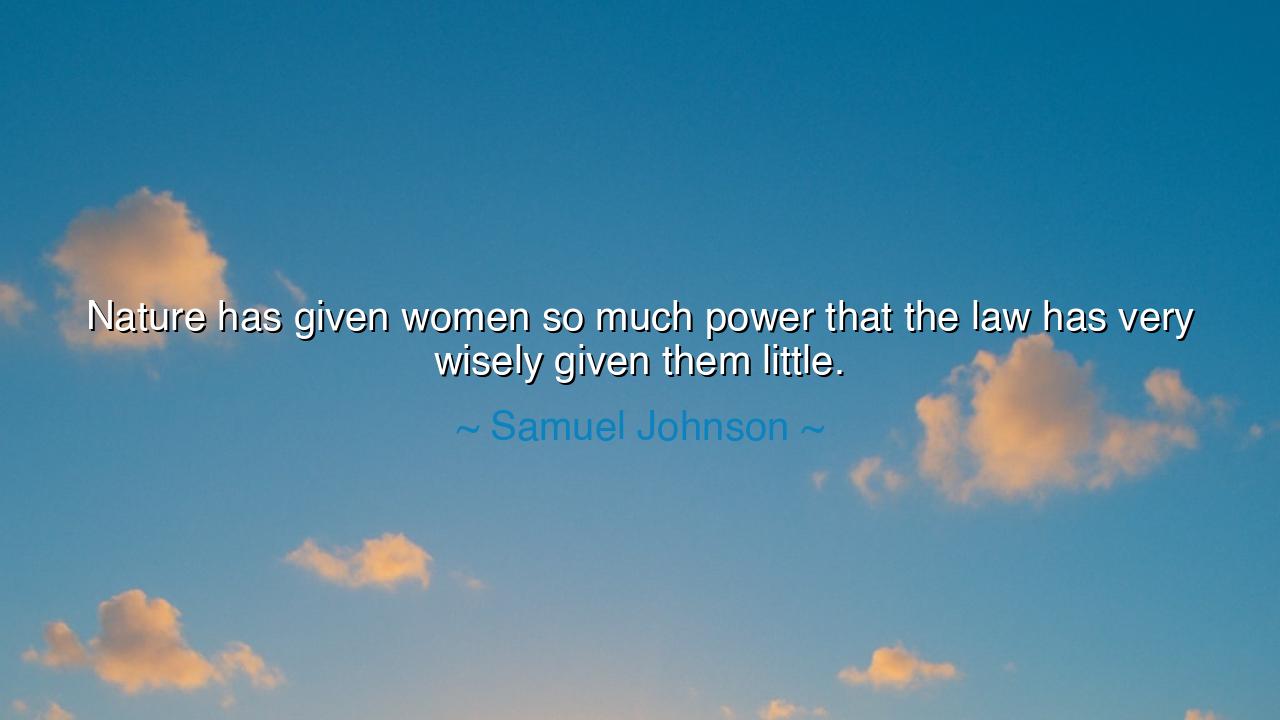
Nature has given women so much power that the law has very






“Nature has given women so much power that the law has very wisely given them little.” Thus spoke Samuel Johnson, the great lexicographer and man of letters of the eighteenth century. His words, though born of another age, carry within them both irony and provocation. They reflect a time when society measured the influence of women not in the halls of parliament, but in the chambers of the heart, not in laws inscribed upon parchment, but in the unseen sway they held over men’s desires, families, and communities. In Johnson’s view, nature had already equipped women with a mysterious and formidable power, and so the law refrained from adding to it.
The meaning of this saying is double-edged. On one hand, it reflects the old belief that women’s true strength lay not in outward authority but in inner influence—the power of charm, persuasion, nurture, and endurance. Johnson suggests that this hidden force was so immense that no legal scaffolding was necessary. Yet, at the same time, the statement reveals the limitations of his age, when the law deliberately withheld from women the rights and liberties given freely to men. Thus, the quote can be read as both an acknowledgment of women’s natural greatness and a justification for denying them equality in public life.
History abounds with examples that reveal both the truth and the irony of Johnson’s words. Consider Cleopatra, Queen of Egypt, who by wit and presence alone swayed the fate of empires, bending even Rome’s mightiest generals to her will. Though the laws of her day limited the scope of female rulers, her natural power was undeniable, and it reshaped the ancient world. Or recall Abigail Adams, wife of America’s second president, who, though denied political office, influenced policy through counsel and letters, urging her husband to “remember the ladies” when shaping the newborn nation. In both cases, we see women wielding profound influence, though often without the outward recognition of law.
The origin of Johnson’s view lies in the culture of his century, when women were largely excluded from formal education, property rights, and civic authority. Yet men of his time, while denying women legal standing, often confessed—sometimes with awe, sometimes with unease—that women’s presence and will shaped society in ways unseen. They ruled in parlors, in nurseries, and in salons; they inspired poets, steadied kings, and raised generations. Johnson’s words reflect this paradox: the law denied them power, even as life proved they possessed it.
There is heroism in the women who bore this paradox with courage. Though confined by law, they transformed their quiet influence into enduring legacy. The mothers who educated their children in secret when denied schooling, the wives who advised statesmen behind closed doors, the poets and thinkers who wrote under false names—these were women who showed that power cannot be silenced, even when shackled. Johnson’s remark, whether he intended it as compliment or critique, points to a truth: the strength of women has always overflowed the limits imposed upon them.
The lesson for us today is to recognize that natural gifts and legal rights should not stand in opposition, but in harmony. To claim that women need no rights because they have natural power is to mistake influence for justice. True wisdom lies in honoring both—the innate strength with which nature endowed them, and the equal rights that law must guarantee them. For only when both are united can humanity flourish in balance.
Therefore, dear listener, let Johnson’s words stir both reflection and resolve. Acknowledge the deep and mysterious power that women carry—the power of creation, of wisdom, of resilience. But also remember that to withhold rights in the name of such power is folly. Work to build a world where natural gifts and legal protections walk together, where women are honored not only for their unseen influence but for their rightful place in the councils of the world. For in that day, humanity shall be whole, and the power of women will shine not only in secret, but in the full light of justice.






AAdministratorAdministrator
Welcome, honored guests. Please leave a comment, we will respond soon